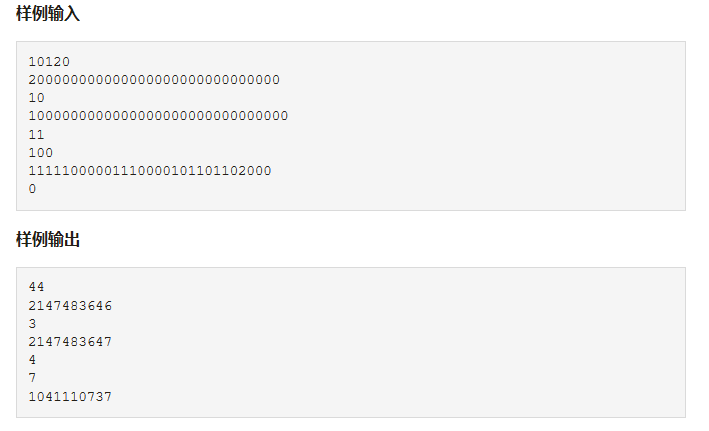- Total time limit:
- 1000ms
- Memory Limit:
- 65536kB
- description
- In skew binary representation, the value of k bits X k represents X k * (2 k +. 1 -1). The numbers above each bit may be 0 or 1, the final surface 2 may be a non-zero bit, e.g., 10120 (skew) = 1 * (2 . 5 -1) + 0 * (2 . 4 -1) + 1 * ( 2 . 3 -1) + 2 * (2 2 -1) + 0 * (2 . 1 -1) = 0 + 31 + 0 + 7 + 6 = 44. The number of the first ten skew is 0,1,2,10, 11,12,20,100,101, and 102.
- Entry
- Input comprising one or more rows, each row contains an integer n. If n = 0 represents the input end, otherwise n is a number skew
- Export
- For each input, output its decimal representation. Converted to decimal, n less than 2 31 is -1 = 2147483647
-

-
#include<iostream> #include<string.h> using namespace std; int main() { int base[31]; int m, n; char skew[32]; base[0] = 1; for (m = 1; m < 31; m++) { base[m] = 2 * base[m - 1] + 1; } while (true) { cin >> skew; n = 0; if (strcmp(skew, "0") == 0) break; int len = strlen(skew); for (m = 0; m < len; m++) { n += base[len - m - 1] * (skew[m] - '0'); } cout << n; } return 0; }
str which is stored character numbers, which turn into numeric types
example str [I] is '1', in fact ascii code is 0x31, and the '0' ascii code is 0x30, using str [i] - '0' get 1Comparative binary string conversion +